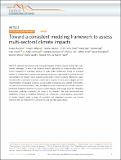Toward a consistent modeling framework to assess multi-sectoral climate impacts
Author(s)
Kicklighter, David; Haigh, Martin; Monier, Erwan; Paltsev, Sergey; Sokolov, Andrei P; Chen, Y.-H. Henry; Gao, Xiang; Ejaz, Qudsia J.; Couzo, Evan; Schlosser, Courtney Adam; Dutkiewicz, Stephanie; Fant, Charles W; Scott, Jeffery R; Morris, Jennifer Faye; Jacoby, Henry D; Prinn, Ronald G; ... Show more Show less
Downloads41467-018-02984-9.pdf (1.065Mb)
PUBLISHER_CC
Publisher with Creative Commons License
Creative Commons Attribution
Terms of use
Metadata
Show full item recordAbstract
Efforts to estimate the physical and economic impacts of future climate change face substantial challenges. To enrich the currently popular approaches to impact analysis - which involve evaluation of a damage function or multi-model comparisons based on a limited number of standardized scenarios - we propose integrating a geospatially resolved physical representation of impacts into a coupled human-Earth system modeling framework. Large internationally coordinated exercises cannot easily respond to new policy targets and the implementation of standard scenarios across models, institutions and research communities can yield inconsistent estimates. Here, we argue for a shift toward the use of a self-consistent integrated modeling framework to assess climate impacts, and discuss ways the integrated assessment modeling community can move in this direction. We then demonstrate the capabilities of such a modeling framework by conducting a multi-sectoral assessment of climate impacts under a range of consistent and integrated economic and climate scenarios that are responsive to new policies and business expectations.
Date issued
2018-02Department
Massachusetts Institute of Technology. Joint Program on the Science & Policy of Global ChangeJournal
Nature Communications
Publisher
Nature Publishing Group
Citation
Monier, Erwan et al. “Toward a Consistent Modeling Framework to Assess Multi-Sectoral Climate Impacts.” Nature Communications 9, 1 (February 2018): 660 © 2018 The Author(s)
Version: Final published version
ISSN
2041-1723